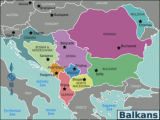A balanced and dynamic approach – George Kaklikis
September 15, 2021
Media |
South-East Europe Programme
Are the Balkans a special case? -Podcast with George Christidis
March 12, 2021
Media |
South-East Europe Programme
Balkans after the Cold War – Interview with G. Christidis
March 9, 2021
Event |
Democracy, Identity, Culture
‘Skopje 2014’ and the return of history – Conference ‘Unknown Balkans’
June 2, 2017 - June 3, 2017
Publication |
European Institutions & Policies
Work Package 3 Deliverables on the informal sector in the Balkan region
December 11, 2008
Publication |
European Institutions & Policies
Working paper 2 on civil society and social capital
December 11, 2008












